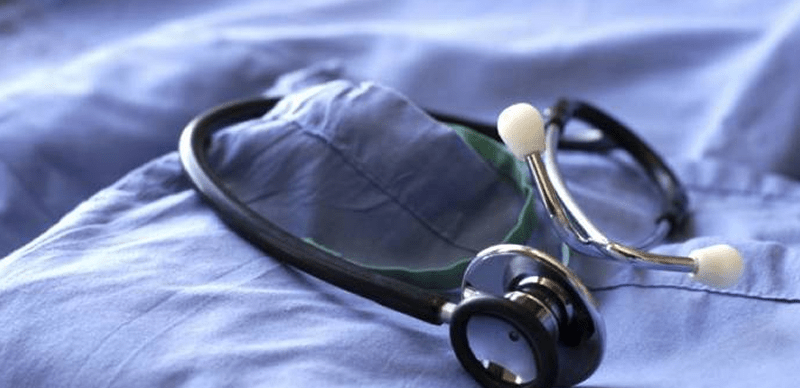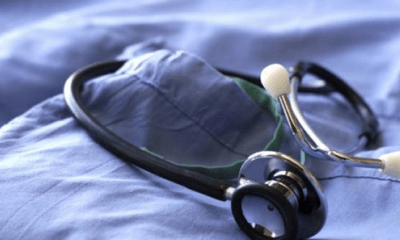Health
World Doctors Slam Reps Over Mandatory Service Bill
Published
1 year agoon
By
Editor
The President of the World Medical Association, WMA, Dr. Osahon Enabulele, on Sunday kicked against the House of Representative Bill mandating any Nigeria-trained medical or dental practitioner to practice in Nigeria for a minimum of five years before being granted full registration/license by the Medical and Dental Council of Nigeria, MDCN.
Enabulele said as one who has engaged the issues of Nigeria’s health system, including the crisis of brain drain, for over 2 decades, he considers the proposition of the sponsors as “not only outlandish, but totally retrogressive, unresearched and very ill-formed.”
Enabulele who spoke after attending the 5th Global Forum on Human Resources for Health in Geneva, said the sponsor of the Bill claimed there are about 10, 000 doctors practising in Nigeria, adding that the claim alone clearly showed the unresearched nature of the proposal.
“From the information available to me, as at 30th December, 2022, there were 104, 327 medical and dental practitioners on the register of the Medical and Dental Council of Nigeria, with the number of practicing doctors put at 56, 829. So, where did he get the figure of 10, 000 from?
READ ALSO: NMA, NERD, Others React To UK Restriction Of Doctors’ Migration
“This Bill sponsored by Hon. Ganiyu Abiodun Johnson shows a clear lack of understanding of the push and pull factors buoying the crisis of brain drain in Nigeria and other parts of Africa; the region worst hit by the crisis.
“I really wonder how this proposition will solve the problem of brain drain which is largely traceable to the indecent and disabling working conditions and infrastructure, insecurity, uncompetitive wages, unemployment and underemployment of medical and dental practitioners, amongst other known factors, most of which I have spoken about over the last 2 decades. Indeed, the recently held 5th Global Forum on Human Resources for Health where I spoke at two important sessions, was in total agreement with this, and the need for a sincere approach to the resolution of these challenges.”
Continuing, he expressed shock that rather than come up with purposive and progressive solutions on how to transparently and comprehensively address the push factors accelerating the crisis of brain drain in Nigeria, through prioritised investments in the health system and the health workforce, they sought to come up with a proposition whose remedy is likely to generate a worse ailment and crisis.
“Furthermore, the Bill seeks to achieve its objective through an amendment of the Medical and Dental Practitioners’ Act. As is well known, a Bill seeking to repeal and re-enact this same Act was passed by the Senate in the year 2021 and awaiting concurrence by the same House of Representatives.
READ ALSO: Japa: Doctors Proffer Solutions At Tinubu Town Hall
“With the time left for legislative business in the outgoing 9th National Assembly, one wonders how the sponsors hope to achieve their aim.
“The proposition shows a poor appreciation of the mechanisms, operations and regulatory framework of the medical profession, and the place and role of the practicing license.”
He further queried: “Where in the world do you deny someone, who has been duly certified qualified according to the Medical and Dental Practitioners Act, a license to practice? Do the sponsors appreciate the fact that their proposition bristles with grave implications for National development, particularly as it concerns specialist training in Nigeria and the delivery of quality healthcare services? What happens to the doctor’s internship period and NYSC service year? What happens to specialist training in Nigeria? Are they going to be repealed or put in abeyance? “
Enabulele said even though it is a truism that doctors are the leaders of the health team, he found the proposition selective and discriminatory.
READ ALSO: NARD: Resident Doctors Warn Of Nationwide Industrial Action
“Available statistics clearly show that all types of professionals and workers in all sectors of Nigeria, aside from the health sector, are voting with their feet outside the shores of Nigeria. Indeed, aside from the younger ones, the senior ones are increasingly been carried by the brain drain waves.
“I equally find the proposition a gross affront on the fundamental rights and freedoms of medical and dental practitioners in Nigeria, as expressed in the relevant provisions of Nigeria’s 1999 Constitution (as amended). Even the ILO conventions are very clear on this, as it concerns the international migration of labour.
“While I am aware that there may be a public hearing on the Bill to allow for public consultations with stakeholders, it would have made a whole lot of sense if the sponsors had taken the pains to consult with stakeholders in the medical profession to derive an informed view on the real factors responsible for the crisis of brain drain in Nigeria.
“I would therefore like to urge the sponsors of the Bill to reconsider their position and withdraw the Bill, as the cure it offers will undoubtedly be worse than the ailment it seeks to cure.
“I sincerely urge them to dwell more on how to more realistically address the push factors and build a resilient health system with a resilient health workforce,” he stated.
READ ALSO: UITH Seizes Corpse Over Assault On Medical Doctor
Recall that the House of Representatives had passed for second reading, a Medical and Dental Practitioners Act (Amendment) Bill, 2022, that seeks to make it compulsory for graduates in medical and dental fields to render services within Nigeria for five years before being granted full license.
Speaking on the Global forum, Enabulele commended the Dr. Tedros Adhanom Ghebreyesus-led World Health Organisation (WHO) for successfully organising the 5th Global Forum on Human Resources for Health.
Stating that it was well-attended by Member States of the WHO, he regretted that Nigeria was not represented.
“I sadly observed that Nigeria was not represented as a Country. There were many sessions where issues confronting the health workforce were deliberated upon, including the issue of brain drain which I have been highlighting at all international fora, including during my tenure as President of the Commonwealth Medical Association.”
He said the 5th Global Forum came up with very useful resolutions on how to resolve the challenges confronting the health workforce.
“As you are aware, the health workforce is vital to the attainment of Universal Health Coverage, and if the resolutions reached at the forum are given concrete expression, I am sanguine that global health and the well-being of citizens and the health workforce will be more assured in the years ahead,” he added.
You may like


Medical Practitioners Inadequate, Over 250,000 Doctors Needed In Nigeria, Says WMA President


Esama @89: WMA President, Enabulele Receives Historic 100 Years-Old Bronze Artefact


BREAKING: MDCN Suspends Four Doctors From Medical Practice


Need For Professional Bodies Involvement In National Development Emphasised


No Work No Pay: ‘Whatever Happens Next Don’t Blame Us’, Doctors Tell Nigerians


Resident Doctors’ Strike Bites Harder As Hospitals Discharge Patients

By Silver Yeibake
Autism, commonly known as Autism Spectrum Disorder (ASD), is a neurodevelopmental disorder that affects communication, social interaction, and behavior. Autism is referred to as a spectrum condition since it can manifest in a variety of symptoms and abilities. While the actual cause of autism is unknown, evidence suggests that genetic and environmental factors interact to influence its development.
The risk factors include a sibling with autism, advanced age of parents, exposure to certain air pollutants and pesticides before birth, extreme prematurity, mothers with diabetes, immune system disorders or obesity, any difficulty with delivery leading to deprivation of oxygen to the baby’s brain, fever during pregnancy, lack of certain vitamins minerals during pregnancy, and certain genetic conditions, such as Down, fragile X, and Rett syndromes.
“Risk factors can not on their own cause a disease. However, they can increase the likelihood of that disease in a person.”
It is important to know that contrary to trending claims online, there is no scientific or medical evidence that vaccines or consumption of sugar are risk factors for autism.
READ ALSO: Kidney Stones: What You Need To Know
Autism is defined by difficulties in social interaction and communication. Individuals with autism may struggle to grasp social cues, maintain eye contact, and engage in typical back-and-forth conversations. Some people may also engage in meaningless, repetitive actions, such as hand-flapping or rocking, and have strong interests in specific areas.
It is essential to remember that autism is a lifelong diagnosis, but with early intervention and adequate care, people with autism can live fulfilling lives.
Autism treatment frequently includes behavioral therapy, speech therapy, occupational therapy, and social skills training. Each individual with autism is unique, thus interventions should be tailored to meet their personal needs and strengths.
In spite of the difficulties that autism can cause, many people with autism possess unique talents and abilities. Some people may succeed in fields such as music, art, mathematics, or programming, thus it is important for society to acknowledge and honor the qualities and achievements of people with autism.
In summary, autism is a complicated and diverse disorder that affects individuals in various ways. By raising autism knowledge, understanding, and acceptance, we can build a more inclusive society in which people with autism can thrive and attain their full potential.
Dr. Yeibake, Weriwoyingipre Silver.
Senior Registrar,
Faculty Of Pediatrics,
WACP
Health
Don Confirms ‘Zobo’ As Antihypertensive Therapy
Published
2 months agoon
March 10, 2024By
Editor
The Deputy Vice Chancellor, University of Nigeria Enugu Campus, UNEC, Prof. Daniel Nwachukwu, after research findings and clinical trials in both animals and human, has confirmed that Hibiscus Sabdariffa, popularly called ‘zobo’ drinks, has all the curative potentials as an antihypertensive therapy.
Nwachukwu, who is a Professor of Cardiovascular Physiology in the university, stated that the antihypertensive effectiveness of the Hibiscus Sabdariffa (zobo) was comparable to those of known antihypertensive drugs that are popular in the retail pharmacies, adding that zobo’s availability, cheapness and absence of side effects make it attractive as an alternative therapeutic agent in mind to moderate hypertensive subjects.
He however cautioned that care should be applied to avoid abuse in the consumption of Hibiscus Sabdariffa (zobo), adding that the therapy could interfere with some anti-malaria drugs while its high dose was also reported to have toxic effects on the liver and kidney.
READ ALSO: How Airline Pilots Fell Asleep Mid-flight – Safety Agency Reveals
Nwachukwu’s discoveries were contained his 201st Inaugural Lecture of the University of Nigeria with the topic “The Marriage Between the Cardiovascular System and Hibiscus Sabariffa: Let no One Put Asunder,” delivered at the moot court hall, Law faculty of the University of Nigeria, Enugu campus.
The DVC warned that Hibiscus Sabariffa consumption is not recommended for persons with low blood pressure because of its well established hypotensive action, advising that during combined therapy with antihypertensive drugs, the blood pressure, BP, must be carefully monitored.
He recommended that industrialists and investors should support large scale production of Hibiscus Sabariffa beverage and its distribution to rural communities in Nigeria, particularly since the raw materials (Hibiscus Sabariffa calyx and water) are cheap and readily available.
READ ALSO: Man Stabs Two Women To Death At A Mexico Varsity
According to Nwachukwu, “This lecture is intended to draw the public attention to our research efforts and unveiling the antihypertensive ability of Hibiscus Sabariffa which is called zobo in our common parlance. What we used for our studies was the same concentration as the locally produced zobo, and we found out that it exerted significant antihypertensive ability, in some cases even higher than the antihypertensive drugs and also did combination therapy with other antihypertensive drugs.
“What is significant is that this zobo is within us, it’s very cheap and it does not have any side effects compared to other antihypertensive agents. The raw material is just to buy zobo, prepare it under hygienic conditions, boil water and put it, sieve it and drink. It may have a sour taste but we do not encourage people to add things like pineapple or sugar in order to make it sweet, because once you do that, you are diluting or reducing its antihypertensive effectiveness.
“We have demonstrated it, both in animal studies and in humans. We are the first to do clinical trials, using mild to moderate antihypertensive Nigerians and we found it very useful. Some of the results show that one can actually use it and we equally saw that you can use it to prevent even diabetes from occurring because it reduces the rise in glucose level.”
READ ALSO: Adolescent Girls Face Risks Of Sexual Violence – UNICEF
Vice Chancellor of the University, Professor Charles Igwe while summarizing the lecture said that the lecture was in three dimensions; one on health grounds, another in academics and the third an economic value.
“Its economic in the sense that we can also begin to use what God has given us to make money. Maybe because God gave us everything in abundance in this country, we don’t recognize the simplest things God gave us in our environment. Therefore, what we are saying is that we should begin to, at all these pure water productions and incorporate zobo production so as to make money out of it.
“The university has made its contribution through our laboratories and it’s now left for the business community and the industries to come and buy into it and start widening it and make it very economic,” Igwe suggested.
Vanguard

By Silver Yeibake
Hi, did you know that Tuesday 12th March, 2024 is world Glaucoma day?Kindly avail yourself of this opportunity to learn about this important health issue as presented below:
Glaucoma is a dangerous eye disorder that damages the optic nerve, causing visual impairment or permanent blindness if not treated.
The optic nerve transmits visual information from the eye to the brain. Damage to this nerve might cause gradual visual loss that is not immediately obvious.
Worldwide, this disease affects 67 million people and contributes 6.7 million of blindness in this population. Glaucoma is the leading cause of blindness in the world.
The total number of cases is expected to increase to 111 million by 2040. Males are slightly more affected than females.
One of the basic causes of glaucoma is an increase in intraocular pressure (pressure within the eyeball), which can eventually damage the optic nerve (the nerve that makes seeing possible). This increase in pressure could be caused by an accumulation of aqueous humor, the fluid that nourishes the eye.
FROM THE AUTHOR: Food Poisoning: What You Need To Know
There are several forms of glaucoma, including open-angle glaucoma, angle-closure glaucoma, normal-tension glaucoma, and secondary glaucoma, each with unique characteristics and treatment choices.
Some of the risk factors for glaucoma include sustained elevation of intraocular pressure, family history of glaucoma, race (African, Asian), short-sightedness, long-sightedness, age over 50, previous eye injury or surgery, hypertension, diabetes mellitus, migraines, and prolonged steroid therapy.
Glaucoma symptoms may not appear until the problem has advanced sufficiently, therefore regular eye checks are essential for early detection. Blurred vision, eye pain, nausea, and light halos are some of the most frequent glaucoma symptoms. However, these symptoms might be mild or readily misinterpreted as other eye problems, emphasizing the significance of regular eye examinations.
Glaucoma treatment tries to reduce intraocular pressure and protect the optic nerve from further damage. This can be accomplished using a variety of approaches, including prescription eye drops, oral medicines, laser therapy, and surgical procedures. Treatment options are determined on the kind and severity of glaucoma, as well as personal characteristics such as overall health and medical history.
To summarize, glaucoma is a serious eye disorder that requires timely diagnosis and treatment to prevent irreversible vision loss. Regular eye examinations, early detection, and commitment to treatment plans are critical for protecting vision and eye health in glaucoma patients.
Thank you.
Dr. Yeibake, Weriwoyingipre Silver, a
Senior Registrar, Faculty Of Pediatrics, West Africa College of Physician (WACP), writes from Yenagoa, Bayelsa State.

PHOTOS: FCCPC Raids Supermarkets In Port Harcourt, Seizes Underweight, Re-bagged Rice

Outrage As Kingsmen Flogged Anambra Man To Death [VIDEO]

Man Declared Wanted For Stabbing Wife To Death, Attempted Murder of Two Children
Trending

 Entertainment3 days ago
Entertainment3 days agoBridesmaids’ Dance At Wedding Causes Stir On Social Media [VIDEO/PHOTOS]

 Politics4 days ago
Politics4 days agoEdo Guber: Akoko-Edo PDP Leaders Meet In Igara, Describe Ighodalo, Ogie As ‘Perfect Match’

 Metro3 days ago
Metro3 days agoVIDEO: ‘UNN Lecturer’ Caught Pants Down With Married Student

 News1 day ago
News1 day agoDrama! Supporters Of Yahaya Bello Perform Rituals to Prevent His Arrest By EFCC [Video]

 News2 days ago
News2 days agoVIDEO: Force PRO Orders Arrest Officers Caught On Video Bashing Driver’s Car

 Headline2 days ago
Headline2 days agoDrama As Women Fight Dirty, Breasts Fall Out During Spring Break Outing In US [PHOTOS/VIDEO]

 News4 days ago
News4 days agoOutrage As Chinese Supermarket In Abuja Denies Nigerians Entry

 News3 days ago
News3 days agoIGP, Jonathan Disagree Over State Police

 Entertainment2 days ago
Entertainment2 days agoNollywood Actor, Zulu Adigwe Is Dead

 Metro1 day ago
Metro1 day agoEdo Cultists Kill Rival In Daughter’s Presence, Abandon Getaway Car


































